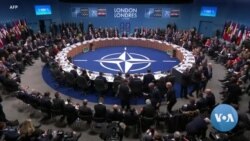ຜູ້ຊ່ຽວຊານຫຼາຍຄົນເວົ້າວ່າ ຂ່າວທີ່ໂດດເດັ່ນທີ່ສຸດຈາກກອງປະຊຸມສຸດ ຍອດອົງການ NATO ທີ່ຖືກຈັດຂຶ້ນເມື່ອບໍ່ດົນມານີ້ໃນນະຄອນຫຼວງ ລອນດອນ ປະເທດ ອັງກິດ ກໍແມ່ນວ່າ ອົງການ NATO, ເຊິ່ງແມ່ນພັນທະມິດທີ່ມີປະສິດທິພາບ ແລະ ຍາວນານທີ່ສຸດຂອງປະຫວັດສາດນັ້ນ, ໄດ້ລະບຸວ່າຈີນ ເປັນສິ່ງທ້າທາຍທາງຍຸດທະສາດເປັນຄັ້ງທຳອິດ. ເຂົາເຈົ້າໄດ້ໂຕ້ແຍ້ງວ່າ ປັກກິ່ງ ຕັ້ງເປົ້າໝາຍທີ່ຈະຄວບຄຸມອຸດສາຫະກຳເທັກໂນໂລຈີລະດັບສູງຂອງໂລກ ຜ່ານບໍລິສັດຍັກໃຫຍ່ດ້ານເທັກໂນໂລຈີ ຫົວເຫວີຍ ຂອງເຂົາເຈົ້າ, ຫຼໍ່ຫຼອມກອງທັບໃຫ້ເທົ່າກັບ ສະຫະລັດ ແລະ ເຊື່ອມຕໍ່ປະຊາກອນສ່ວນຫຼາຍຂອງໂລກພາຍໃຕ້ໂຄງການນຶ່ງແລວ-ນຶ່ງເສັ້ນທາງຂອງເຂົາເຈົ້າ. ນັກຂ່າວວີໂອເອ ເຈລາ ເດິ ແຟຣນເຊັສຈີ (Jela de Francheschi) ໄດ້ລົມກັບອະດີດຜູ້ບັນຊາການສູງສຸດຂອງ ອົງການ NATO ກ່ຽວກັບ ຄວາມສ່ຽງທາງພູມສາດກົນລະຍຸດ ຈາກ ຈີນ. ເຊິ່ງ ພຸດທະສອນ ຈະນຳລາຍລະອຽດມາສະເໜີທ່ານໃນອັນດັບຕໍ່ໄປ.
ການສົນທະນາຕ່າງໆ ຢູ່ກອງປະຊຸມຂອງອົງການ NATO ໃນນະຄອນຫຼວງ ລອນດອນ ໄດ້ເພັ່ງເລັງໃສ່ການຮັບຮູ້ວ່າ ຈີນ ແມ່ນຜູ້ແຂ່ງຂັນເພື່ອພັນທະມິດທີ່ເປັນຕາຢ້ານຂອງໂລກ, ເຊິ່ງວ່ອງໄວ ແລະ ມີອຳນາດກວ່າສະໄໝສະຫະພາບ ໂຊວຽດ, ອີງຕາມການກ່າວຂອງອະດີດຜູ້ບັນຊາການທະຫານສູງສຸດຂອງອົງການ NATO, ນາຍພົນບຳນານ ທ່ານ ເຈມສ໌ ໂຈນສ໌.
ນາຍພົນ ເຈມສ໌ ໂຈນສ໌ ອະດີດຜູ້ບັນຊາການພັນທະມິດສູງສຸດ ຂອງອົງການ NATO ໄດ້ກ່າວວ່າ “ເປົ້າໝາຍຍຸດທະສາດຂອງເຂົາເຈົ້າແມ່ນການຄອບງຳປະຊາຊົນຂອງເຂົາເຈົ້າແນ່ນອນ ແລະ ຫຼາຍເທົ່າທີ່ຈະເຂົາເຈົ້າຈະເຮັດໄດ້ໃນໂລກ. ເຂົາເຈົ້າເຮັດໃນທາງທີ່ຊຳນານຫຼາຍ, ດ້ວຍການແຊກຊຶມ ແລະ ລົງທຶນໃນເສດຖະກິດຂອງພວກເຮົາ ໃຊ້ເທັກນິກທີ່ເກືອບວ່າເປັນຊະນິດແບບປະເທດທຶນນິຍົມ. ໃນເວລາດຽວກັນ, ເຂົາເຈົ້າກໍກຳລັງພັດທະນາການສອດແນມດ້ານການຮັກສາຄວາມປອດໄພທາງຄອມພິວເຕີ ແລະ ການລັກຊັບສິນທາງປັນຍາ ໃຫ້ມີປະສິດທິຜົນແບບບໍ່ມີໃຜທຽບເທົ່າໄດ້.”
ຈີນ ມີຈຸດປະສົງທີ່ຈະເຂົ້າຄວບຄຸມພື້ນຖານໂຄງລ່າງທາງດິຈິຕອລຂອງສັດຕະວັດທີ 21, ດ້ວຍການຊ່ວຍເຫຼືອຂອງບໍລິສັດຍັກໃຫຍ່ດ້ານເທັກໂນໂລຈີ ຫົວເຫວີຍ.
ທ່ານ ໂຈນສ໌ ໄດ້ທຳນາຍວ່າ ຈີນ ຈະໃຊ້ຄວາມໄດ້ປຽບໃນສະຖານະພາບຂອງເຂົາເຈົ້າເພື່ອຄວາມໄດ້ປຽບທີ່ເດັດດ່ຽວເໜືອ ສະຫະລັດ ແລະ ພັນທະມິດຂອງເຂົາເຈົ້າ.
ນາຍພົນ ເຈມສ໌ ໂຈນສ໌ ກ່າວວ່າ “ອົງການຈັດຕັ້ງຄື NATO ຕ້ອງໄດ້ປ້ອງກັນລະບົບຂອງເຂົາເຈົ້າແທ້ໆ ເພື່ອທີ່ຈະສາມາດຢູ່ລອດໄດ້. ເຈົ້າຈະປ່ອຍໃຫ້ 10 ປະເທດຢູ່ກັບ ຫົວເຫວີຍ ແລະ 20 ປະເທດກັບຢ່າງອື່ນບໍ່ໄດ້. ເຫດຜົນທີ່ຂ້າພະເຈົ້າມີຄວາມກະຕືລືລົ້ນ ກ່ຽວກັບ ມັນກໍແມ່ນຕອນນີ້ມັນໄດ້ເປັນບັນຫາ. ມັນບໍ່ແມ່ນ 10 ປີຈາກນີ້. ມັນແມ່ນດຽວນີ້.”
ທ່ານ ໂຈນສ໌ ເວົ້າວ່າ ການແຂ່ງຂັນເພື່ອອຳນາດສູງສຸດໃນກຸ່ມຫ້າປະເທດແມ່ນສຳຄັນເທົ່າກັບການຜະລິດລະເບີດປະລະມານູລູກທຳອິດ ຫຼື ເອົາຄົນຂຶ້ນໄປເທິງເດືອນ.
ນາຍພົນ ເວັສລີ ຄລາກ, ອະດີດຜູ້ບັນຊາການພັນທະມິດສູງສຸດຂອງອົງການ NATO ໄດ້ກ່າວວ່າ “ຈີນ ແມ່ນກຳລັງຂະຫຍາຍອຳນາດ, ເຂົາເຈົ້າມີປະຊາຊົນຫຼາຍກວ່າ ສະຫະລັດ ສີ່ເທົ່າ. ເຂົາເຈົ້າມີຄົນຊັ້ນກາງທີ່ຫຼາຍກວ່າປະຊາກອນ ເມຣິກັນ ທັງໝົດ. ເຂົາເຈົ້າເຮັດໄດ້ດີຫຼາຍດ້ວຍການນຳເອົາການລົງທຶນຕ່າງປະເທດ ແລະ ເທັກໂນໂລຈີຕ່າງປະເທດ ເຂົ້າໄປໃນປະເທດ.
ເພື່ອຫຼຸດຜ່ອນຄວາມສ່ຽງໃຫ້ຫຼາຍທີ່ສຸດນັ້ນ, ອົງການ NATO ຕ້ອງໄດ້ຄິດແຜນທີ່ຈະປ້ອງກັນການສືບຫາອຳນາດສູງສຸດໃນໂລກຂອງ ຈີນ, ອີງຕາມການກ່າວຂອງອະດີດຜູ້ບັນຊາການພັນທະມິດສູງສຸດຂອງອົງການ NATO ທ່ານ ເວັສລີ ຄລາກ.
ນາຍພົນ ເວັສລີ ຄລາກ ກ່າວວ່າ “ມັນບໍ່ໄດ້ມີຫຍັງດີສຳລັບ ສະຫະລັດ ທີ່ຈະທຳການກົດດັນ ຈີນ ກ່ຽວກັບ ເທັກໂນໂລຈີ ແລ້ວໃຫ້ ເຢຍຣະມັນ ຫຼື ຝຣັ່ງ ຫຼື ພັນທະມິດອື່ນໆຂອງອົງການ NATO ຂາຍເທັກໂນໂລຈີດຽວກັນໃຫ້ ຈີນ. ນັ້ນແມ່ນສິ່ງທ້າທາຍຂອງພວກເຮົາ, ແລະ ພວກເຮົາຕ້ອງເຮັດວຽກກັບພັນທະມິດຂອງພວກເຮົາເພື່ອຮັບມືກັບ ຈີນ. ຖ້າພວກເຮົາເຮັດແນວນັ້ນ, ແນ່ນອນ, ພວກເຮົາຈະສາມາດຈັດການກັບສິ່ງທ້າທາຍຂອງ ຈີນ.
ການຮຽກຮ້ອງໃຫ້ເພັ່ງເລັງໃສ່ ປັກກິ່ງ ຫຼາຍຂຶ້ນໂດຍລັດຖະບານ ວໍຊິງຕັນ ໄດ້ຄົ້ນພົບຜູ້ຟັງທີ່ອ່ອນໄຫວໃນຫຼາຍປະເທດຂອງ ຢູໂຣບ, ບ່ອນທີ່ຄວາມເປັນຫ່ວງກຳລັງເພີ່ມຂຶ້ນ ກ່ຽວກັບ ການເຕີບໂຕທາງເສດຖະກິດ, ທະຫານ ແລະ ເທັກໂນໂລຈີທີ່ກ້າວໜ້າຂອງ ຈີນ.
ທ່ານ ເຈັນສ໌ ສໂຕລເທັນເບີກ, ເລຂາທິການໃຫຍ່ອົງການ NATO ໄດ້ກ່າວວ່າ “ເປັນຄັ້ງທຳອິດ, ທີ່ພວກເຮົາກ່າວເຖິງການເຕີບໂຕຂອງ ຈີນ, ທັງສິ່ງທ້າທາຍ ແລະ ໂອກາດຕ່າງໆຂອງເຂົາເຈົ້າ, ແລະ ສິ່ງທີ່ກ່ຽວຂ້ອງສຳລັບຄວາມປອດໄພຂອງພວກເຮົາ. ບັນດາຜູ້ນຳໄດ້ຕົກລົງວ່າ ພວກເຮົາຕ້ອງແກ້ໄບັນຫານີ້ນຳກັນໃນຖານະເປັນພັນທະມິດດຽວກັນ.
ອົງການສົນທິສັນຍາ ມະຫາສະໝຸດ ແອັດແລນຕິກເໜືອ ຫຼື NATO ທີ່ມີສະມາຊິກ 29 ປະເທດ, ເຊິ່ງໄດ້ສະເຫຼີມສະຫຼອງວັນຄົບຮອບ 70 ປີໃນຕົ້ນເດືອນທັນວານັ້ນ, ໄດ້ເປັນຕົວແທນໃຫ້ເຄິ່ງນຶ່ງຂອງເສດຖະກິດໂລກ ແລະ ມະຫາອຳນາດດ້ານກອງທັບ.
Many experts say the most remarkable news from the recently held NATO summit in London is that NATO, history's most lasting and effective alliance, for the first time defined China as a strategic challenge. They contend that Beijing aims to dominate the world's high-tech industry through its technology giant Huawei, forge a military on par with the United States, and connect the majority of the world's population under its Belt and Road Initiative. VOA's Jela de Franceschi talks with two former NATO supreme commanders about the geostrategic risks posed by China.
Conversations at NATO's London gathering centered on the recognition that China is a daunting global competitor for the alliance- one more nimble and powerful than the Soviet Union ever was, says former top NATO military commander, retired General James Jones.
"Their strategic goal is dominance over their people for sure and over as much of the world as they can get their hands on. They are doing it in a very skillful way, by penetrating and investing in our economies using almost capitalist-type techniques. At the same time, developing cybersecurity espionage and intellectual property theft to unparalleled effectiveness."
China aims to take over the digital infrastructure of the 21st century, with the help of its tech giant Huawei.
Jones predicts China will exploit its position to gain a coercive advantage over the United States and its allies.
"An organization like NATO really has to have a secure system in order to be viable. You cannot have 10 countries with Huawei and 20 countries with something else. The reason I am passionate about it is that it is a now issue,' it is not 10 years from now. It is now.
Jones says the race for5G supremacy is as critical as the one to produce the first atomic bomb or to put a man on the moon.
"China is a rising power; it has four times the population of the United States. It has a middle class that is larger than the entire American population is. It has done extremely well by bringing in foreign investment and foreign technology.
To minimize the risks, NATO must come up with a plan to defend against China's quest for global supremacy, says former NATO Supreme Allied Commander Wesley Clark.
"It does not do any good for the United States to put pressure on China with regard to technology and then have Germany or France or some other NATO ally sell the same technology to China. That's our challenge, and we need to work with our allies to deal with China. If we do that, yes, we can manage the challenge of China.
Washington's call for greater focus on Beijing has found a receptive audience in much of Europe, where concerns are mounting about China's growing economic, military and cyber technology advantage.
"For the first time, we addressed the rise of China, both the challenges and the opportunities it poses, and the implications for our security. Leaders agree that we need to address this together as an alliance."
The 29-member North Atlantic Treaty Organization, which celebrated its 70th anniversary in early December, represents half the world's economic and military might.





